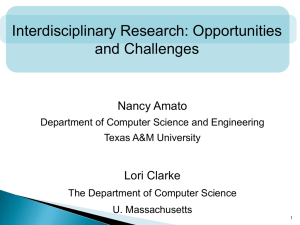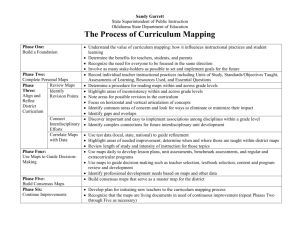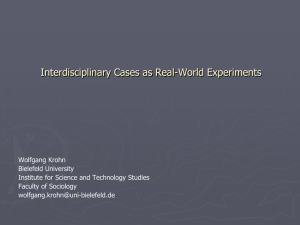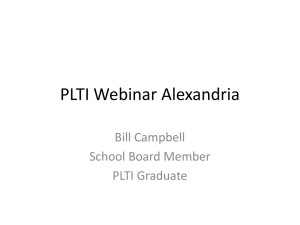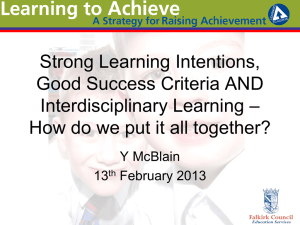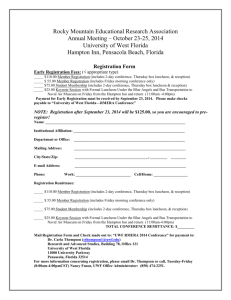Syllabus - University of West Florida
advertisement
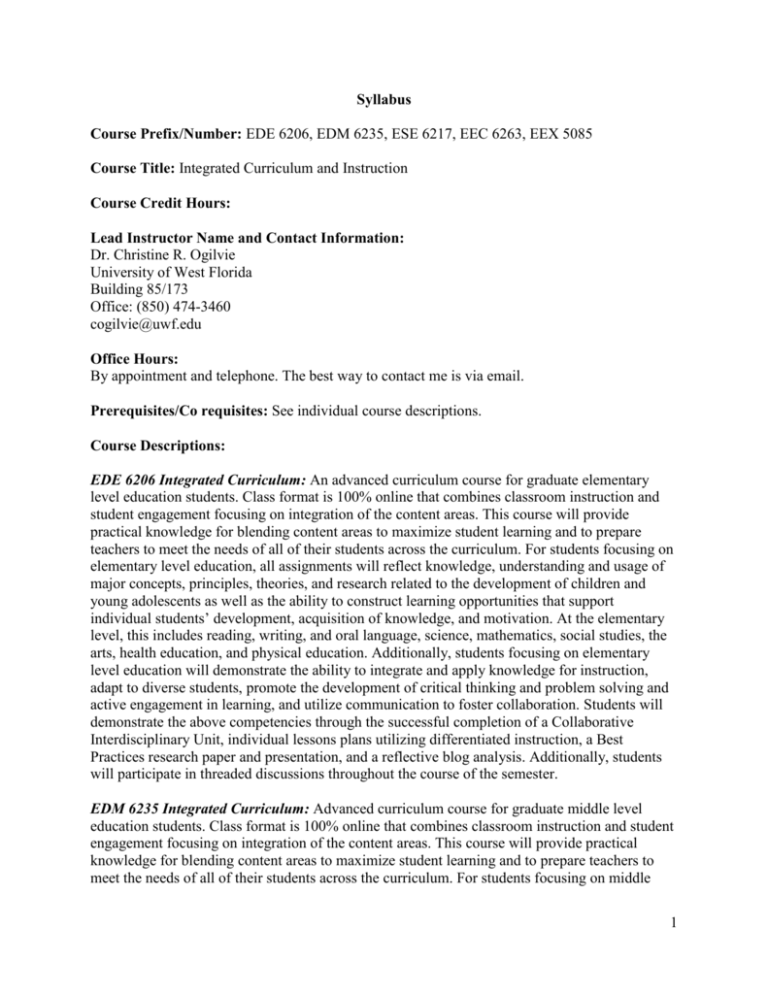
Syllabus Course Prefix/Number: EDE 6206, EDM 6235, ESE 6217, EEC 6263, EEX 5085 Course Title: Integrated Curriculum and Instruction Course Credit Hours: Lead Instructor Name and Contact Information: Dr. Christine R. Ogilvie University of West Florida Building 85/173 Office: (850) 474-3460 cogilvie@uwf.edu Office Hours: By appointment and telephone. The best way to contact me is via email. Prerequisites/Co requisites: See individual course descriptions. Course Descriptions: EDE 6206 Integrated Curriculum: An advanced curriculum course for graduate elementary level education students. Class format is 100% online that combines classroom instruction and student engagement focusing on integration of the content areas. This course will provide practical knowledge for blending content areas to maximize student learning and to prepare teachers to meet the needs of all of their students across the curriculum. For students focusing on elementary level education, all assignments will reflect knowledge, understanding and usage of major concepts, principles, theories, and research related to the development of children and young adolescents as well as the ability to construct learning opportunities that support individual students’ development, acquisition of knowledge, and motivation. At the elementary level, this includes reading, writing, and oral language, science, mathematics, social studies, the arts, health education, and physical education. Additionally, students focusing on elementary level education will demonstrate the ability to integrate and apply knowledge for instruction, adapt to diverse students, promote the development of critical thinking and problem solving and active engagement in learning, and utilize communication to foster collaboration. Students will demonstrate the above competencies through the successful completion of a Collaborative Interdisciplinary Unit, individual lessons plans utilizing differentiated instruction, a Best Practices research paper and presentation, and a reflective blog analysis. Additionally, students will participate in threaded discussions throughout the course of the semester. EDM 6235 Integrated Curriculum: Advanced curriculum course for graduate middle level education students. Class format is 100% online that combines classroom instruction and student engagement focusing on integration of the content areas. This course will provide practical knowledge for blending content areas to maximize student learning and to prepare teachers to meet the needs of all of their students across the curriculum. For students focusing on middle 1 school level education, all assignments will focus on understanding and analyzing the major concepts, principles, theories, and research related to young adolescent development and the application of such. This also includes middle level curriculum and assessment, middle level teaching fields, and middle level instruction and assessment. Students will demonstrate the above competencies through the successful completion of a Collaborative Interdisciplinary Unit, individual lessons plans utilizing differentiating instruction, a Best Practices research paper and presentation, and a reflective blog analysis. Additionally, students will participate in threaded discussions throughout the course of the semester. Admission to Teacher Education is required. ESE 6217 Integrated Curriculum: Advanced curriculum course for graduate secondary education students. Class format is 100% online that combines classroom instruction and student engagement focusing on integration of the content areas. This course will provide practical knowledge for blending content areas to maximize student learning and to prepare teachers to meet the needs of all of their students across the curriculum. For students focusing on the secondary level, students will demonstrate the above competencies through the successful completion of a Collaborative Interdisciplinary Unit, individual lessons plans utilizing differentiated instruction, a Best Practices research paper and presentation, and a reflective blog analysis. Additionally, students will participate in threaded discussions throughout the course of the semester. Prerequisite: ESE 6215. EEX 5085 Integrating Curriculum and Instruction: Class format is 100% online that combines classroom instruction and student engagement focusing on integration of the content areas. This course will provide practical knowledge for blending content areas to maximize student learning and to prepare teachers to meet the needs of all of their students across the curriculum. Special Educators at all levels are often called upon to be content experts in many areas while also providing accommodations and modifications for diverse students. For students focusing on special education, all assignments will focus on demonstrating knowledge of models, theories, philosophies, and research methods that form the basis for evidence-based practices in special education. This knowledge includes information sources, data collection, and data analysis strategies as well as how to foster environments supportive of continuous instructional improvement. Students will demonstrate the above competencies through the successful completion of a Collaborative Interdisciplinary Unit, individual lessons plans utilizing differentiated instruction, a Best Practices research paper and presentation, and a reflective blog analysis. Additionally, students will participate in threaded discussions throughout the course of the semester. EEC 6263 Early Childhood Education Integrated Curriculum Development and Instruction/Early: Class format is 100% online that combines classroom instruction and student engagement focusing on integration of the content areas. This course will provide practical knowledge for blending content areas to maximize student learning and to prepare teachers to meet the needs of all of their students across the curriculum. For students focusing on the early childhood education level, all assignments will focus on the implementation of a curriculum that is consistent with its goals for children and promoting learning and development in the social, emotional, physical, language, and cognitive areas. Additionally, the assignments completed by students focusing on the early childhood education level, will include developmentally, culturally, and linguistically appropriate and effective teaching approaches that enhance each 2 child’s learning and development in the context of the program’s curriculum goals. Furthermore, students focusing on the early childhood education level will be able to demonstrate support to families’ diverse needs and interests through education, knowledge, and professional commitment. Students will demonstrate the above competencies through the successful completion of a Collaborative Interdisciplinary Unit, individual lessons plans utilizing differentiated instruction, a Best Practices research paper and presentation, and a reflective blog analysis. Additionally, students will participate in threaded discussions throughout the course of the semester. At least one course in early childhood education is required. Prerequisite: EEC 3704. Purpose of the Course: The Empowered Professional Making a Difference is the theme of the Professional Education Unit’s conceptual framework. This theme focuses learning experiences on activities that permit the candidate to examine what he/she does and to make a difference in the instructional process. The subject matter, class activities, and skill development of this course were selected to assist your professional growth in one or more of the following Empowered Professional Making a Difference characteristics: a) critical thinker, b) lifelong learner, c) counselor/mentor, d) decision maker, e) problem solver, and f) ethical/moral professional. The State of Florida has responded to national and state initiatives in education reform and accountability by creating legislative policies relative to the preparation of educators. Florida’s Uniform Core Curricula outline the knowledge, skills and dispositions that candidates require to be successful in Florida’s educational system. This is a critical curriculum and methods course to determine different strategies to connect and interrelate with the various disciplines. The Florida department of education has recommended an integrated course to connect discipline-based content and methodology. To monitor your progress in this teacher preparation program, Key Assignments are required. Key Assignments are specific learning activities that directly relate to the course and program learning outcomes. A passing grade (70% or higher) is required on each of the student learning outcomes identified on the assignment in order to receive a grade for the course and advance in the teacher education program. (Specific details are provided in your Teacher Education Handbook.) Program Student Learning Outcomes 1.3 Articulate and apply the content and practices central to the areas of specialization. 2.1 Explore the current literature related to problem solving and critical thinking and design activities that will enable students to improve their creative thinking abilities. 5.1 Use emergent instructional technology hardware and software to manage, evaluate, and improve instruction. 6.2 Act as a student advocate by seeking information about students’ culture, home situations and backgrounds, and use the community to provide a variety of experiences. Course Student Learning Outcomes: 3 Upon conclusion of this course, students will: 1. Demonstrate knowledge of best practices in the content area and how these relate to other content areas evidenced the successful completion of a Best Practices research paper and presentation. 2. Demonstrate knowledge of Florida's Accomplished Practices, Florida’s Sunshine State Standards and specific grade level (ACEI, NAEYC, CEC, NMSA) standards as well as select national standards (NBPTS) evidenced by the successful completion of a Collaborative Interdisciplinary Unit. 3. Demonstrate knowledge of differentiated instruction and multiple learning styles demonstrated by the successful completion of 3 lesson plans. 4. Demonstrate the ability to be a critical thinker, problem solver, ethical / moral professional, and decision maker evidenced by the successful completion of class threaded discussions and the reflective analytical blog. 4 Course Alignments by Assessments, Outcomes, and Standards: Project Name Conceptual Program NCATE FEAPs SpecializationNBPTS and Framework Standard Addressed Areas Assessment Outcomes SLOs Addressed Tool (Characteristics) Interdisciplinary Ethical/Moral Unit Professional 1.3 5.1 Best Practices Critical Thinker Final Unit Decision Maker Problem Solver 1c 2, 4, 5, 10, NAEYC: 2, 2 3 ACEI: 1, 2, 3 NMSA: 1, 3, 2.1 5, 8, 12 CEC: 2 NMSA: 4, 5 6.2 5, 9, 10, 12 4 Resources for State and National Standards: Florida Educator Accomplished Practices (FEAPS) o http://www.fldoe.org/dpe/pdf/AccomPractices_11-09-07.pdf Sunshine State Standards (SSS) o http://www.fldoe.org/bii/curriculum/sss/ Council for Exceptional Children Standards for Professional Practices in relation to Persons with Exceptionalities and Their Families (CEC) o http://www.cec.sped.org/Content/NavigationMenu/ProfessionalDevelopment/Professi onalStandards/Professional_Standa.htm National Board for Professional Teaching Standards (NBPTS) o http://www.nbpts.org Early Childhood Program Standards (NAEYC) o http://www.naeyc.org/files/academy/file/OverviewStandards.pdf Middle School: Master Level Teacher Preparation Standards (NMSA) o http://www.nmsa.org/ProfessionalPreparation/NMSAStandards/tabid/374/Default.asp x Association for Childhood Education International Elementary Education Standards (ACEI) 5 o http://acei.org/wpcontent/uploads/ACEIElementaryStandardsSupportingExplanation.5.07.pdf Tentative Schedule / Topics Covered: Week Topic 1 Introduction to Integrated Curriculum and Interdisciplinary Thematic Units 2 Understanding Your Students 3 Adapting for Individual Differences 4 Backwards Design: Beginning with the End in Mind 5 Initiating an Interdisciplinary Thematic Unit 6 Initiating an Interdisciplinary Thematic Unit 7 Developing Objectives 8 Assessing Student Learning 9 What Does a Good Rubric Look Like? 10 Evaluating Student Progress 11 12 13 Building Culturally Responsive Family – School Partnerships: Essential Beliefs, Strategies, and Skills Completing Your ITU: Finalizing Activities and Units Completing Your ITU: Finalizing Activities and Units Texts: Required: 1. Integrated Curriculum – A Custom Pearson Textbook created by the instructor ISBN: 1-256-00371-9 2. TK20 Subscription (One time purchase for all courses) available directly at http://uwf.tk20.com or through the UWF campus bookstore - Student Access Kits (ISBN 09774408-1-8). If you have had no prior experience with TK20 and have questions, please contact Dr. Richard Faessel (TK20 administrator) at rfaessel@uwf.edu. MUST BE PURCHASED by MIDTERM. 6 Course Requirements & Grade Determination: *All assignments must be submitted to the appropriate drop box for evaluation. 1. Best Practices in Integrating Curriculum - Research Paper and Presentation (300 pts) (PowerPoint) - Students will be required to extensively research best practices associated with their content area (i.e. elementary areas, high school chemistry, middle school mathematics) and construct a PowerPoint presentation based on a brief traditional research paper on the exemplary practices they find. You should search online scholarly and peer reviewed journals in your field. Examples of best practices in the classroom to help you do an effective presentation will be available. TK20 KEY ASSIGNMENT 2. Individual Lesson Plan Utilizing Differentiated Instruction (100 pts) - You will be required to individually plan and develop three direct instruction lesson plans to be included in your interdisciplinary unit based on your content area or the area you and your partner negotiate. The lesson plan format will be prescribed by the instructor. Former examples of exemplary lesson plans will be provided. The final product should be saved as a Microsoft Word document. There is not a page limit to this project, since resource availability varies by discipline. A qualitative professional analysis, based on a rubric, will be used to grade this project. Students will present their lesson plan to the class in discussions section. 3. Collaborative Interdisciplinary Unit (300 pts) - You will be required to plan and develop an interdisciplinary unit with at least one colleague. The unit WILL include full lesson plans in each subject area. I will provide exemplars for you to review and gain an understanding of the requirements. The final product should be saved as a PowerPoint with presentation notes attached. There is not a slide limit to this project, since resource availability varies by discipline. A qualitative professional analysis, based on a rubric, will be used to grade this project. Students will submit their interdisciplinary unit to their peers in the discussion section under the appropriate topic as a PowerPoint. Examples will be provided to guide you through this process. 4. Reflections & Final Reflective Analysis: (200 pts) - You will include reflections throughout the class. Reflections will be submitted every other week via a blog posting and will be evaluated as a single product. The first two submissions will focus on your experiences and processing of the class concepts. The final reflection will include an analysis of integrated curriculum and suggestions for how to use this knowledge in your future classroom 5. Class Discussions (100 pts) - You will be graded for your class participation during the entire semester throughout the threaded discussions. Your participation grade is based on active involvement for every assignment and discussion session. Your participation in the discussions includes reading what your classmates have posted in a timely manner and responding to classmates discussion entries. Further directions for collaborative activities are provided within the content of the course. Grading Criteria: A 900 – 1000 points B 800 – 899 points 7 C 700 – 799 points D+ 600 – 699 points F Below 599 points Note: Key Assignments must be submitted in TK20. You must earn 70% or better on the identified student learning outcomes of this assignment to pass this course and continue in this Teacher Education program. Special Technology Utilized by Students: Each UWF Student is expected to: - activate a UWF ArgoNet email account - access email two to three times weekly - have basic word processing knowledge - purchase and activate a TK20 account Statement of the University Policy on Academic Conduct: The Student Code of Conduct sets forth the rules, regulations and expected behavior of students enrolled at the University of West Florida. Violations of any rules, regulations, or behavioral expectations may result in a charge of violating the Student Code of Conduct. It is the student's responsibility to read the Student Code of Conduct and conduct themselves accordingly. You may access the current Student Code of Conduct at http://www.uwf.edu/judicialaffairs. Assistance for Individuals with Special Needs: Students with special needs who require specific examination-related or other course-related accommodations should contact the Student Disability Resource Center (SDRC), sdrc@uwf.edu, 850.474.2387. SDRC will send an email to the instructor that specifies any recommended accommodations. UWF TurnItIn notice: UWF maintains a university license agreement for an online text matching service called TurnItIn. At my discretion I will use the TurnItIn service to determine the originality of student papers. If I submit your paper to TurnItIn, it will be stored in a TurnItIn database for as long as the service remains in existence. If you object to this storage of your paper: 1. You must let me know no later than two weeks after the start of this class. 2. I will utilize other services and techniques to evaluate your work for evidence of appropriate authorship practices. Syllabus Notice of Change: Although this syllabus is intended for multiple audiences and incorporates the minimum course criteria, the content of this syllabus may change based on individual instructor's specifications. Any modifications to this syllabus will be announced during the first week of the semester. 8 References/Bibliography: 1. Armstrong, T. (1994). Multiple intelligences in the classroom. Alexandria, VA: The Association for Supervision and Curriculum Development. 2. Beane, J. (Ed.). (1995). Toward a coherent curriculum. Alexandria, VA: The Association for Supervision and Curriculum Development. 3. Berko, R., Rosenfeld, L. & Samovar, L. (1997). Connecting (2nd ed). San Antonio, TX: Harcourt-Brace. 4. Brooks, J. & Brooks, M. (1993). In search of understanding: The case for constructionist classrooms. Alexandria, VA: Association for Supervision and Curriculum Development. 5. Cole, R. (Ed.) (1992). Educating everybody’s children: Diverse teaching strategies for diverse learners. Alexandria, VA: The Association for Supervision and Curriculum Development. 6. Drake, S. (1993). Planning integrated curriculum. Alexandria, VA: The Association for Supervision and Curriculum Development. 7. Eisner, E. (1990). Creative curriculum development and practice. Journal of Curriculum and Supervision, 6(1), 62-73. 8. Florida Department of Education (1996). School improvement and accountability standards. Tallahassee, FL; Author. 10. Frazee, B. & Rudnitski, R. (1995). Integrated teaching methods. Cincinnati, OH: Delmar Publishers. 11. Gardner, H. (1985). Frames of mind: The theory of multiple intelligences. New York: Basis Books. 12. Gonzalez, V., Brusca-Vega, R., & Yawkey, T. (1997). Assessment and instruction of culturally and linguistically diverse students with or at-risk of learning problems. Boston: Allyn and Bacon. 15. Halpern, D. (1995). Thinking critically about critical thinking. Mahwah, NJ: Lawrence Earlbaum, Inc. 17. Hubbard, B. & Power, B. (1993). The art of classroom inquiry. A handbook for teacher researchers. Portsmouth, NH: Heinemann. 20. Kellough, R. (1997). A resource guide for teaching K-12, (2nd ed.). Columbus, OH: Merrill. 9 21. Kendall, J. & Marzano, R. (1996). Content knowledge: A compendium of standards and benchmarks for K-l2 education. Alexandria, VA: The Association for Supervision and Curriculum Development. 24. Kucer, S., Silva, C. & Delgado-Larocco, E. (1995). Curricular conversations. York, ME: Stenhouse Publishers. 25. Marzano, R. & Kendall, J. (1996). A comprehensive guide to designing standards-based districts, schools, and classrooms. Alexandria, VA: The Association for Supervision and Curriculum Development. 26. Marzano, R., Pickering, D. & McTigle, J. (1993). Assessing student outcomes. Alexandria, VA: Association for Supervision and Curriculum Development. 27. Maurer, R. (1994). Designing interdisciplinary curriculum in middle, junior high, and high schools. Needham Heights, MA: Allyn and Bacon. 28. Miller-Lachmann, L. & Taylor, L. (1995). Schools for all: Educating children in a diverse society. Boston, MA: Delmar. 29. Mohlman Sparks-Langer, G. & Colton, A. (1991). Synthesis of research on teachers’ reflective thinking. Educational Leadership 48(6), 37-44. 30. Newmann, F. (Ed). (1992). Student engagement and achievement in American secondary schools. New York: Teachers College Press. 31. Putnam, J. (1997). Cooperative learning in diverse classrooms. Upper Saddle River, New Jersey: Merrill. 32. Readence, J., Bean, J. & Baldwin, R. (1995). Content area literacy. An integrated approach (5th ed.). Dubuque, 10: Kendall/Hunt Publishers. 33. Ryder, R. & Hughes, T. (1997). Internet for educators. Columbus, OH: Prentice-Hall. 34. Sadowski, M. (1995). Moving beyond traditional subjects requires teachers to abandon their comfort zones. The Harvard Education Letter 11(5), 1-7. 35. Short, K., Schroeder, J., Laird, J. Kauffman, G., Ferguson, M. & Crawford, K. (1996). Learning together through inquiry. From Columbus to integrated curriculum. York, ME: Stenhouse Publishers. 36. Slavin, R. (1990). Cooperative learning: Theory, research, and practice. Englewood Cliffs, N.J.: Prentice-Hall. 37. Tomlinson, C. (1995). How to differentiate instruction in mixed-ability classrooms. Alexandria, VA: The Association for Supervision and Curriculum Development. 10 38. Villa, R. & Thousands, J. (Eds.). (1995). Creating an inclusive school. Alexandria, VA: The Association for Supervision and Curriculum Development. 39. Wiggins, G. (1993). Assessing student performance. San Francisco: Josey-Bass. 41. Weinstein, C. & Mayer, R. (1989). The teaching of learning strategies. In J. Sheinker and A. Sheinker (Eds.), Metacognitive approaches to study strategies. Rockville, MD: Aspen. 42. Yelon, S. (1996). Powerful principles of instruction. White Plains, New York: Longman. 43. Zeichner, K., & Liston, D. (1996). Reflective teaching. Mahwah, NJ: Lawrence Erlbaum, Inc. 44. Zemelman, S., Daniels, H. & Hyde, A. (1993). Best practices: New standards for teaching and learning in America’s schools. Portsmouth, NH: Heinemann. 11


